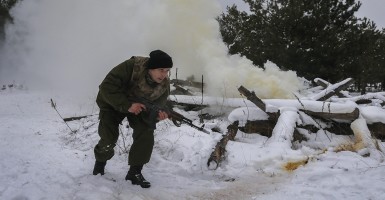Should the U.S. send defensive weapons to the Ukrainian military?
That question is currently consuming top policymakers in Washington, even as a renewed ceasefire agreement has been announced.
Admittedly, this seems like a pressing issue, as Russian-backed separatists previously broke the September 2014 ceasefire agreement to seize additional territory in eastern Ukraine. Sending defensive weaponry would therefore seem like a good insurance policy to hedge against further aggression.
However, if the question is how the United States can best support Ukrainian sovereignty, then there are other factors that merit consideration.
The new Minsk ceasefire contains points that were similar to those included in the September deal: the cessation of hostilities in eastern Ukraine (effective Feb. 15), a withdrawal of heavy weapons, on the ground monitoring from the Organization for Security and Co-operation in Europe, the withdrawal of all foreign troops from Ukraine and a dialogue regarding new elections in Donetsk and Luhansk.
While there is little hope to believe that the new agreement will be honored – Russian aggression since the September deal is well documented – the United States should honor Kyiv’s desire to maintain the new agreement – regardless of whether they elect to receive defensive weapons or not.
Ukraine is a sovereign state, and if the United States and the rest of the international community wish to make this point abundantly clear to Putin, then listening to Ukrainian leadership is a must. It is important that this is done in order to illustrate Ukrainian legitimacy and doing so also ensures that our principles and policy options are aligned.
To give the new ceasefire a greater chance of success and deter further aggression from Russia, the United States should send defensive weapons as part of a larger strategy that would include lifting restrictions on U.S. energy exports to Europe, withdrawing from the New Strategic Arms Reduction Treaty, and strengthening the North Atlantic Treaty Organization alliance.
While Russia has an abysmal record of honoring ceasefire agreements, the United States should back Ukraine’s play – doing so is a national interest. In the event that Kyiv requests defensive weapons from Washington – either to establish a deterrent and further strengthen the possibility of sustaining the new ceasefire agreement or in event that the agreement fails and hostilities resume – U.S. policymakers should have a strategic plan ready.
If we have learned anything about Putin, it that he is unpredictable and has a tendency to renege on his assurances. His recent signing of “strategic partnership treaties” with separatists in two breakaway regions in Georgia illustrate this and makes it clear that action needs to be taken to halt his adventurism. Failure to do so will only further whet his appetite. To uphold the system of world order that has benefited America and the world at large, it is in our interest to have a contingency plan in place in the likelihood that situation further deteriorates.





























